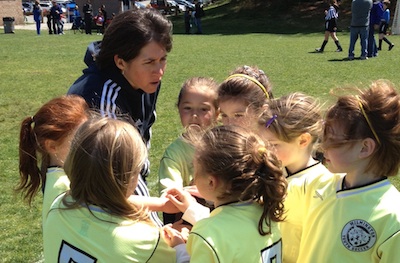Benfica USA’s Model to Recruiting Women Coaches
Dr. Dina Gentile is the owner/director of Precision Soccer, LLC, which operates camps, clinics, and coaching education training. She offers her model program for recruiting female coaches.
According to US Youth Soccer, women comprise 20% of the 300,000 youth coaches working with our children (Huckleberry, 2016). The research by Tucker Center for Research on Girls & Women in Sport reports participation by females is at a record high, but the college coaching scene presents a different story with less than half of women’s teams being coached by females. Title IX was the legislation that was enacted to create equity in sport, but we are at a crossroads when it comes to coaching. Club soccer programs can launch a deliberate effort to encourage more qualified women into the coaching pipeline.
Benfica USA, took a mindful approach to recruiting female coaches to work within the Precision Soccer program. Four years ago the club could count the number of female coaches with two fingers and both were assistant coaches. My motivation after being named the Girls Program Director was to connect with more women who played collegiate soccer and showed an inclination to want to give back to the sport. The process of engaging new coaches and securing them into coaching positions encompassed a three-year journey.

In the first year, the goal was to contact colleagues coaching college or high school soccer to gather names of potential women who could be targeted as effective coaches. Fortunately, I teach at a local college and hire many college players to work summer camps and specialty clinics. Through the network of college level players and coaches, a pool of candidates materialized. From that pool, my task was to share the philosophy of our club while trying to encourage these qualified candidates to sign on as coaches. During this time frame, four female coaches who had previous club coaching experiences or coached high school soccer, joined our club as head coaches for our U9-U11 teams.
 Through the recruitment process, a few general concerns emerged from the prospective candidates during the decision making process. First, they were balancing graduate work and a career outside of coaching. Second, they wanted to be sure they were able to commit fully to the schedule including practices and games. In order to ease the minds of these coaches, Benfica USA implemented a concise plan to secure women coaches for the girls’ teams. The key was instituting a collaborative approach to managing our training sessions.
Through the recruitment process, a few general concerns emerged from the prospective candidates during the decision making process. First, they were balancing graduate work and a career outside of coaching. Second, they wanted to be sure they were able to commit fully to the schedule including practices and games. In order to ease the minds of these coaches, Benfica USA implemented a concise plan to secure women coaches for the girls’ teams. The key was instituting a collaborative approach to managing our training sessions.
In year one for the fall, winter, and spring seasons we held training at one site for multiple teams in order to accommodate the coaches’ schedules and to be sure we always had enough clinicians on hand to deliver a quality practice. In addition, as the Girls Director, I was able to efficiently utilize my time to be with all teams at the same site on multiple days versus having team training a variety of sites on different days. Several outcomes developed through this plan.

One outcome of this planning allowed for the new coaches to get a sense of the system of training employed by Benfica USA teams. Another outcome was the camaraderie and cohesion that developed by having multiple coaches at the same site on the same days. Each coach became familiar with all players in the program due to sharing the same space. A third outcome of the plan was my ability, as the Girls Program Director, to observe the strengths of each coach enabling me to provide direct and constructive feedback to the team of coaches at the end of each practice and more importantly allowed me to match coaches with the needs of the teams.
In year two, the club made a financial decision to add multiple coaches to each girls team due to the realization that working as co-coaches benefited each age group and allowed coaches to feel less pressure to balance the demands in their professional careers and personal lives. A direct outcome of the club investment was the coaches felt more connected to the club and more valued by club administration. These coaches grasped the importance of team-teaching and felt accountable to the club as a whole versus a sole allegiance to their specific team.
In year three (2015-2016), our girls program doubled in size with the addition of multiple teams across many age groups. This increase in the popularity of Benfica USA can be attributed to many reasons including the club’s philosophy on player development but many anecdotal parents have indicated that one major reason was the value of having women coaching their daughters. Some parents comments centered on the way our coaches shared training sessions allowing players to connect with and learn from multiple coaches providing an enhanced soccer experience. Parents have recognized the importance of having female role models for their daughter to emulate and strive to be like as they progress through their soccer career.
We also experienced benefits within the boys program when we had our female coaches run a variety of training session for boys’ teams or cover games for their male counterparts. Now our boys get a great opportunity of being exposed to confident and influential female coaches. Our staff meetings are filled with diverse viewpoints since we have coaches with varying experiences and methods for educating and engaging young people.
Recap of the Benfica USA Model to Recruiting Women Coaches:
1. Reach out to college programs, encourage recent graduates to work within the club, foster a collaborative spirit, offer reimbursement for coaching courses, provide relevant feedback to improve aspects of teaching.
2. Be flexible with schedules and allow for team-coaching in order to provide a comfortable and rewarding experience for coaches.
3. Celebrate and value the coaches and their efforts.
Female coaches are strong and intelligent role models for girls. Female athletes benefit from learning from leaders who have played the game at high levels while passing on their passion to the next generation of players. The goal is to make sure players have a chance to develop and grow from the coaches they work with. In order to effectively recruit and retain female coaches, soccer clubs need to make deliberate decisions including flexibility from an administrative standpoint and financial investments in the hiring process.
Information on Precision Soccer Camp
References:
Huckleberry, S. (2016). The Benefits of Women Getting Involved as Youth Soccer Coaches [PDF]. US Youth Soccer Symposium.
Research. (n.d.). Retrieved January 28, 2016, from http://www.cehd.umn.edu/tuckercenter/research/default.html#collapseTwo
SoccerToday contributing columnist Dr. Dina Gentile is a Professor of Sport Management at Endicott College. A volunteer youth coach herself, Dr. Gentile understands from both practical and theoretical experience what happens on the soccer field. Gentile has also coached the Endicott College Soccer Team for 11 years. Gentile is also the owner/director of Precision Soccer, LLC, which operates camps, clinics, and coach education training throughout the year. She is a former All-American and Academic All-American at Adelphi University. Gentile has been inducted into the Adelphi University and Endicott College Halls of Fame. Gentile is the Girls Program Director and Assistant Director of Coaching with New England Premiership Club – Benfica USA. She is the proud coach of her daughter and son’s soccer teams in Massachusetts.





